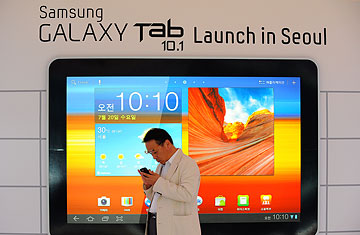
A South Korean man uses his smart phone in front of an advertisement for Samsung Electronics' tablet computer, the Galaxy Tab 10.1, at the company's main building in Seoul on July 20, 2011
Updated: Sept. 12, 2011 at 2:50 a.m. EST
In 1977, when South Korea was a poor but industrializing country, an American business consultant named Ira Magaziner visited Samsung Electronics at its campus, an hour's drive north of the capital, Seoul. He was not impressed. "The research lab reminded me of a dilapidated high school science classroom," wrote the young professional, who later became a health care adviser to President Bill Clinton.
One brainstorming tactic, however, piqued his curiosity. "They'd gathered color televisions from every major company in the world — RCA, GE, Hitachi — and were using them to design a model of their own," he noted in his 1988 book The Silent War: Inside the Global Business Battles Shaping America's Future. The strategy worked. When Magaziner returned to Suwon five years later, the site looked sharp, sophisticated and technologically on par with those of American corporations. And, in a break with industry tradition, the engineers were building both color televisions and their internal parts.
Nearly three decades later, that obscure, family-run firm has grown into a global electronics colossus and is the world's largest producer of televisions and second biggest maker of smart phones. That triumph, though, has brought the conglomerate into a raucous league of competitors that frequently sue one another over what they call patent infringements. Some say the litigation is designed to protect competitiveness and innovation, while others claim it's a market trick to block challengers. This summer, Samsung has roused the fury of tech giant Apple, igniting a remarkable legal battle that spans North America, Europe, Australia and Asia.
In an April filing and a subsequent update in a Northern California court, Apple says Samsung violated eight of its technology patents, seven of its design patents and six of its trademarks on computer icons, mainly when Samsung developed the Android-based Galaxy smart phones and tablet computers. The California-based company claims it owns the rights to the touchscreen gadgetry used on the iPad and iPhone and, among other patented features, the products' trade appearance, consisting of the color black and chamfered corners.
The South Korean firm has vowed to fight back. "Samsung's development of core technologies and strengthening our intellectual-property portfolio are keys to our continued success," it said in a statement regarding the original April lawsuit. "Samsung will respond actively to this legal action taken against us through appropriate legal measures to protect our intellectual property." Since April, Samsung has countersued Apple in six countries, asserting that Apple copied 12 of its patents, primarily when it built its crown jewels, the iPhone and iPad.
Though still in their early phases in most places, Apple's motions are swiftly escalating in the European Union. On Sept. 9, a court in Düsseldorf banned sales of the Galaxy Tab 10.1 tablet in Germany, ruling that the "predominant overall impression" among "informed customers" was that the device looks like the iPad. This followed a preliminary injunction issued by the same court on Sept. 2 that forced Samsung to pull its Galaxy Tab 7.7 out of a Berlin electronics show and off German shelves. These barricades could do serious damage to Samsung's current tablets: they'll lose precious sales time in a market in which new products quickly become old news.
In Australia and the U.S., the process is moving more sluggishly. Because of legal proceedings in Sydney, Samsung has indefinitely postponed its Tab 10.1 launch event in Australia, originally set for Aug. 11. In early July, Apple filed for a preliminary injunction in a California court to stop Samsung from selling four of its new gadgets in the U.S., a request that will be heard in mid-October. As part of its opposition to Apple's application, Samsung claims that the design for the iPad first appeared in the 1968 film 2001: A Space Odyssey, long before Steve Jobs garnered his celebrity.
In the mobile-computing arena, it's a common practice for opponents to make deals before courts decide on sales cordons, allowing defendants to continue selling their products while paying royalties to accusers. But Apple is one important player that doesn't seek patent-licensing revenues, meaning that Samsung can't buy its way out of the dispute, says Florian Mueller, a popular blogger on intellectual-property issues. "Samsung is innovative in certain areas, but its future as a maker of nameplate smart phones and tablet computers is uncertain," he says.
Samsung Electronics wants to be seen as an innovator. "We strongly believe that we have our own competitiveness," says Koh Dong-jin, a Samsung vice president of mobile-communications research and development. "In terms of 3G and 4G telecommunications technologies, Samsung has built an enormous amount of know-how and patents." Last year the group was awarded 4,551 patents in the U.S., the second largest number after IBM. Apple, however, was awarded 563 last year.
